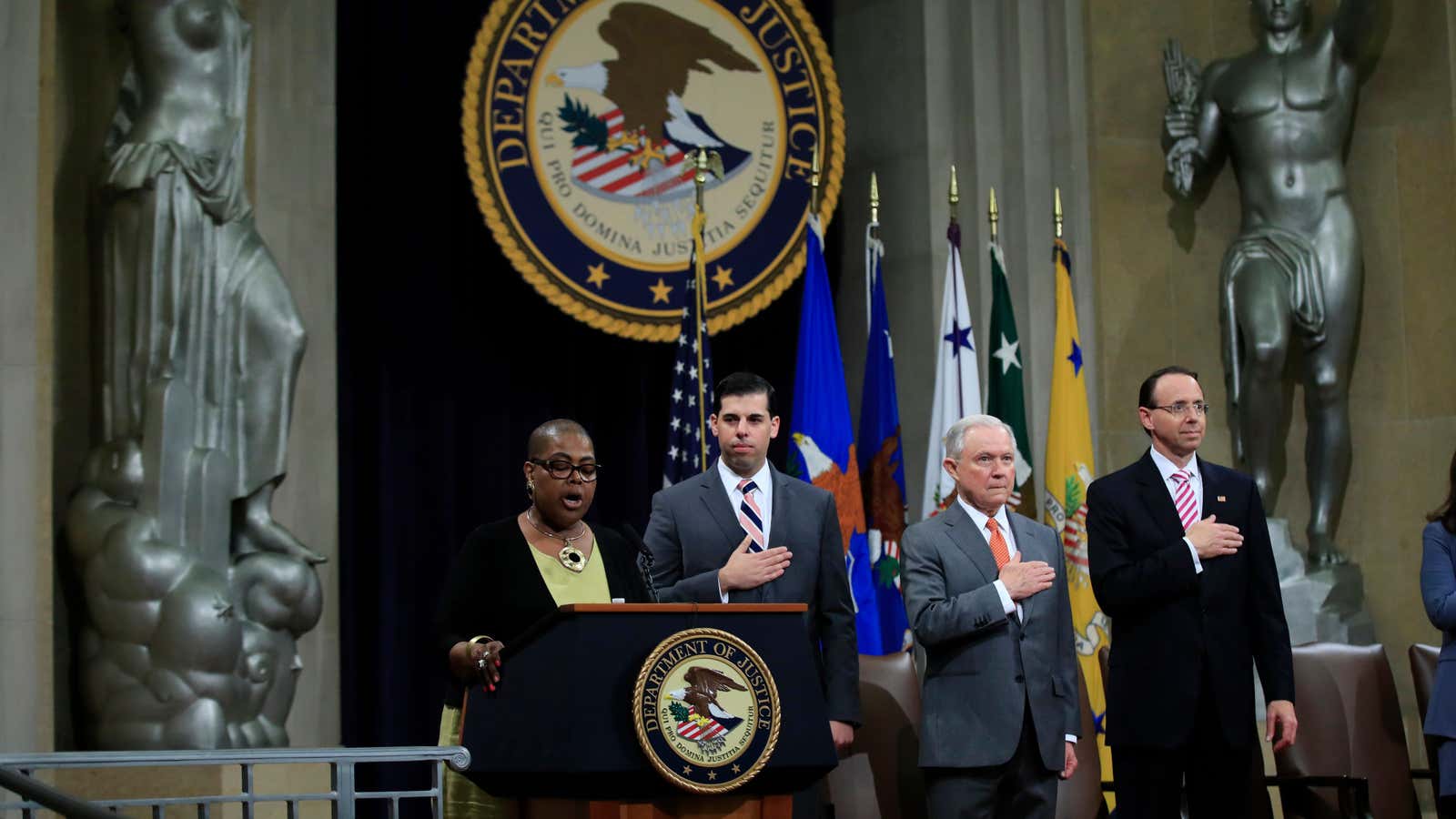Jeff Sessions is worried. In a July 30 address at the Department of Justice’s (DOJ) Religious Liberty Summit, the US attorney general claimed that “a dangerous movement, undetected by many, is now challenging and eroding our great tradition of religious freedom.” US religious groups were being labeled as “hate groups,” he said, simply for following their beliefs.
To further protect religious freedom, Sessions announced the creation of a new “Religious Liberty Task Force,” charged with enforcing 20 principles announced in a 2017 Department of Justice memorandum. The move appears to prioritize religious freedom over civil liberties in some cases; according to the memo, protections against workplace discrimination would be secondary to employers’ rights to hire people who share their beliefs. Sessions emphasized this in his address, saying “Freedom of religion is indeed our ‘first freedom’—being the first listed right of our First Amendment.”
Sessions noted the Trump administration’s commitment to religious freedom, citing the president’s Christian invocation of “Merry Christmas,” as well as its support of Colorado baker Jack Phillips, who refused service to a gay couple due to his Christian beliefs. The Trump administration has also enacted policies that closely align with the political agenda of conservative US Christians, including cutting funds to organizations that offer abortion counseling, allowing religious employers to decline to provide birth control to employees, and attempting to ban transgender people from the military.
The administration has not shown the same attention to the political claims of other religious groups. However, Sessions pointed out that the DOJ’s protection of religion also protects non-Christians, listing cases in which the government sued against local zoning laws in order to allow religious groups including Orthodox Jews, Muslims, and Hindus to build places of worship.
The 20 principles enforced by the Religious Liberty Task Force
- The freedom of religion is a fundamental right of paramount importance, expressly protected by federal law.
- The free exercise of religion includes the right to act or abstain from action in accordance with one’s religious beliefs.
- The freedom of religion extends to persons and organizations.
- Americans do not give up their freedom of religion by participating in the marketplace, partaking of the public square, or interacting with government.
- Government may not restrict acts or abstentions because of the beliefs they display.
- Government may not target religious individuals or entities for special disabilities based on their religion.
- Government may not target religious individuals or entities through discriminatory enforcement of neutral, generally applicable laws.
- Government may not officially favor or disfavor particular religious groups.
- Government may not interfere with the autonomy of a religious organization.
- The Religious Freedom Restoration Act of 1993 prohibits the federal government from substantially burdening any aspect of religious observance or practice, unless imposition of that burden on a particular religious adherent satisfies strict scrutiny.
- RFRA’s protection extends not just to individuals, but also to organizations, associations, and at least some for-profit corporations.
- RFRA does not permit the federal government to second-guess the reasonableness of a religious belief.
- A governmental action substantially burdens an exercise of religion under RFRA if it bans an aspect of an adherent’s religious observance or practice, compels an act inconsistent with that observance or practice, or substantially pressures the adherent to modify such observance or practice.
- The strict scrutiny standard applicable to RFRA is exceptionally demanding.
- RFRA applies even where a religious adherent seeks an exemption from a legal obligation requiring the adherent to confer benefits on third parties.
- Title VII of the Civil Rights Act of 1964, as amended, prohibits covered employers from discriminating against individuals on the basis of their religion.
- Title VIl’s protection extends to discrimination on the basis of religious observance or practice as well as belief, unless the employer cannot reasonably accommodate such observance or practice without undue hardship on the business.
- The Clinton Guidelines on Religious Exercise and Religious Expression in the Federal Workplace provide useful examples for private employers of reasonable accommodations for religious observance and practice in the workplace.
- Religious employers are entitled to employ only persons whose beliefs and conduct are consistent with the employers’ religious precepts.
- As a general matter, the federal government may not condition receipt of a federal grant or contract on the effective relinquishment of a religious organization’s hiring exemptions or attributes of its religious character.
